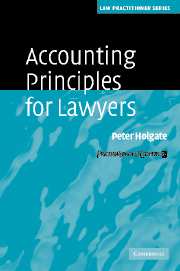Book contents
- Frontmatter
- Contents
- Acknowledgements
- Glossary of terms
- Part I The accounting environment
- 1 Introduction
- 2 UK GAAP and international harmonisation
- 3 The legal framework for accounting
- 4 Substance over form
- 5 The accounting profession and the regulatory framework for accounting and auditing
- 6 Communicating accounting information
- 7 Current trends in accounting
- Part II Some specifics
- Appendices
- Index
5 - The accounting profession and the regulatory framework for accounting and auditing
from Part I - The accounting environment
Published online by Cambridge University Press: 28 July 2009
- Frontmatter
- Contents
- Acknowledgements
- Glossary of terms
- Part I The accounting environment
- 1 Introduction
- 2 UK GAAP and international harmonisation
- 3 The legal framework for accounting
- 4 Substance over form
- 5 The accounting profession and the regulatory framework for accounting and auditing
- 6 Communicating accounting information
- 7 Current trends in accounting
- Part II Some specifics
- Appendices
- Index
Summary
The accounting profession
There are currently six major accountancy bodies in the UK and Ireland:
The Institute of Chartered Accountants in England and Wales (ICAEW)
The Institute of Chartered Accountants of Scotland (ICAS)
The Institute of Chartered Accountants in Ireland (ICAI)
The Association of Chartered Certified Accountants (ACCA)
The Chartered Institute of Management Accountants (CIMA)
The Chartered Institute of Public Finance and Accountancy (CIPFA)
The vast majority of practising members of the profession are in one of the first three Institutes. The ICAEW is the largest, although ICAS is proud to be the oldest body. ACCA includes some practitioners and many members overseas. Many of the members of these four bodies, having trained in the profession, work in industry and commerce, and members of CIMA do so almost exclusively. CIPFA members work almost entirely in the public sector.
These bodies to some extent compete with each other – not least for students and, therefore, for members. They also co-operate on some matters through the Consultative Committee of Accountancy Bodies (CCAB). Setting accounting standards and auditing standards used to be in the domain of the CCAB – the Accounting Standards Committee and the Auditing Practices Committee were CCAB bodies from the 1970s for about twenty years. However, in 1990, the accounting standards activity was moved away from the profession and the new Accounting Standards Board (see below) was formed.
- Type
- Chapter
- Information
- Accounting Principles for Lawyers , pp. 56 - 63Publisher: Cambridge University PressPrint publication year: 2006

